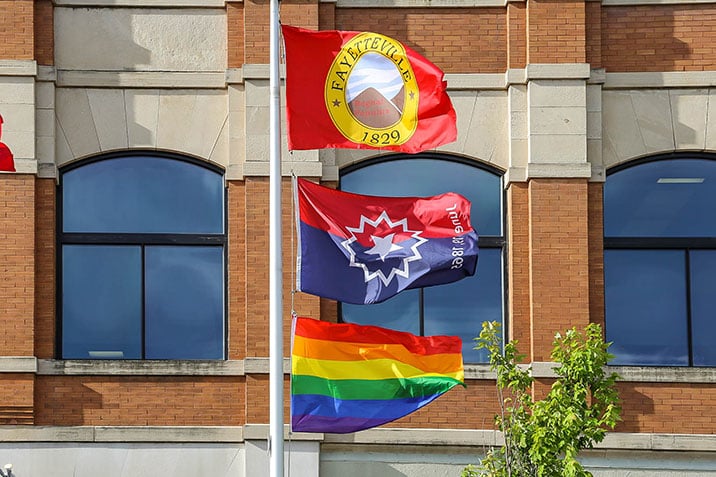
Fayetteville will officially celebrate Juneteenth for the first time when city offices close on Monday.
Juneteenth, which recognizes the effective end of slavery in the U.S., was added to the city’s calendar of official paid holidays last year when the City Council approved a proposal from Council Member D’Andre Jones.
In his proposal, Jones included a one-year delay before the holiday became a paid day off in case there were any budgetary issues with giving city employees an extra day off work.
Juneteenth is observed on June 19 and commemorates the day when Union soldiers landed at Galveston, Texas, in 1865 with news that the war had ended and that an estimated 250,000 enslaved African Americans in Texas were now free — nearly two and a half years after Abraham Lincoln abolished slavery.
Last year, Congress and President Joe Biden made Juneteenth a national holiday. It was the first new national holiday designation since Martin Luther King Jr. Day was approved in 1983.
While most states recognize Juneteenth in some way, many have been slow to make it a paid holiday. Many states, including Arkansas, have issued proclamations or resolutions, but have not advanced proposals to close state offices and give public employees paid time off.
Legal paid holidays in Arkansas include New Year’s Day (Jan. 1), Dr. Martin Luther King Jr.’s birthday (Jan. 8), George Washington’s birthday and Daisy Gatson Bates’ Day (Feb. 15), Memorial Day (May 31), Independence Day (July 4), Labor Day (Sept. 16), Veteran’s Day (Nov. 11), Thanksgiving Day (Nov. 25), Christmas Eve (Dec. 24), and Christmas Day (Dec. 25).

City officials on Tuesday hoisted two new flags at City Hall as a show of support for Pride Month and Juneteenth.
Photo: City of Fayetteville
Under Fayetteville’s new law, city offices will close on June 19. If the holiday falls on a Saturday, offices will close the Friday before, and if it falls on a Sunday, offices will close the Monday after.
When the Fayetteville holiday was proposed, several residents spoke to the council, including Raven Cook with the Northwest Arkansas chapter of the NAACP.
Cook said the resolution offers Fayetteville a chance to reflect on how the legacy of systems tied to American caste and white supremacy still impacts the community today.
“Juneteenth is a part of the history I carry,” said Cook. “It is in the echoes of my voice, it is in my flesh and my spirit. And I am a resident of this city.”
That history, she said, is tied to enslaved Africans who were brought to the U.S. through forced migration, most who were taken from their language, their families, and their culture.
Cook said understanding those systems and approving policies for change can move a city toward not just inclusive language, but also inclusive practice.
Jones agreed, and said while the city is welcoming, it’s important to continue to push for change.
“When I think about Fayetteville, I think about diversity, I think about inclusion and I think about equity, but there’s one aspect that’s missing, and that is belonging,” Jones said. “If we adopt this resolution, I believe that is the first step of African Americans and other disenfranchised individuals saying, ‘I belong in Fayetteville.'”
After the discussion, the council voted 8-0 to pass the resolution.
“This makes me very happy,” Jones said. “Fayetteville is once again leading the state.”

